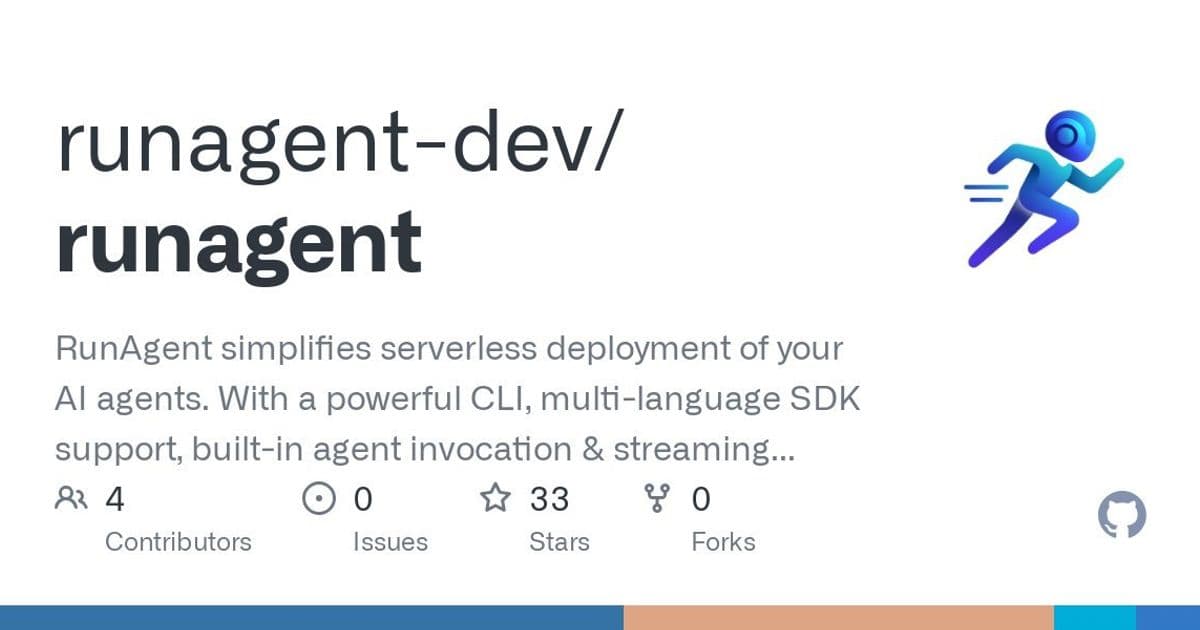RunAgent introduces a paradigm shift in AI deployment by enabling developers to write agents once in Python and access them natively from any programming language—eliminating REST API complexities. With local debugging today and serverless cloud scaling coming in 2025, it promises seamless integration across Rust, JavaScript, Go, and Python stacks while supporting major AI frameworks.
The fragmentation of modern tech stacks—where Python dominates AI development but applications span JavaScript frontends, Rust systems, and Go microservices—has long forced painful workarounds. RunAgent tackles this head-on with a radical proposition: Write AI agents once in Python, deploy them anywhere, and invoke them natively across languages.
Breaking Down Language Silos
RunAgent’s core innovation lies in its language-agnostic SDKs. Developers define agent logic in Python using frameworks like LangChain, CrewAI, or custom code, then expose functions as entrypoints via a simple runagent.config.json file. The platform generates idiomatic clients for:
# Python SDK
from runagent import RunAgentClient
ra = RunAgentClient(agent_id="<id>", entrypoint_tag="minimal")
result = ra.run(message="Analyze Q2 sales trends")
// JavaScript SDK
import { RunAgentClient } from 'runagent';
const response = await ra.run({ role: 'user', message: query });
Even streaming responses feel native, leveraging language-specific patterns like Rust’s futures::Stream or Go’s iterator model. This erases the friction of REST APIs, serialization, and error handling across boundaries.
Deployment Flexibility: From Laptop to Global Scale
RunAgent’s CLI (runagent serve) spins up a local FastAPI server with hot-reload and real-time monitoring—critical for debugging complex agent workflows. The forthcoming cloud platform (Q2 2025) adds auto-scaling, edge distribution, and webhook integrations via runagent deploy.
Key architectural pillars:
- Framework Agnosticism: Templates for LangGraph, CrewAI, Letta, and custom agents
- Unified Streaming: Real-time chunked responses in all SDKs
- Production-Ready: Built-in logging, metrics, and retry logic
Why This Matters for Engineering Teams
For polyglot organizations, RunAgent slashes integration costs. Frontend teams consume AI capabilities without Python expertise, while backend services in Rust/Go leverage Python’s AI ecosystem natively. It’s equally transformative for:
- Legacy Modernization: Inject AI into aging systems without rewrites
- Microservices: Centralize agent logic while distributing access
- High-Performance Apps: Offload Python-based AI to optimized runtimes
"The ability to iterate locally and deploy identically to cloud infrastructure eliminates the ‘it works on my machine’ trap plaguing AI pipelines," notes an early adopter’s case study.
The Road Ahead
While the open-source core is available now, RunAgent’s roadmap targets enterprise needs: private cloud deployment, SOC2 compliance, and advanced RBAC by 2025. Its Elastic License 2.0 permits commercial use but restricts managed-service offerings—a balance encouraging adoption while preventing cloud-provider exploitation.
As AI permeates every layer of software, RunAgent’s vision of language-agnostic agents could finally unify fragmented development workflows. For teams wrestling with AI integration spaghetti, it’s not just a tool—it’s a lifeline.
Source: RunAgent GitHub Repository

Comments
Please log in or register to join the discussion